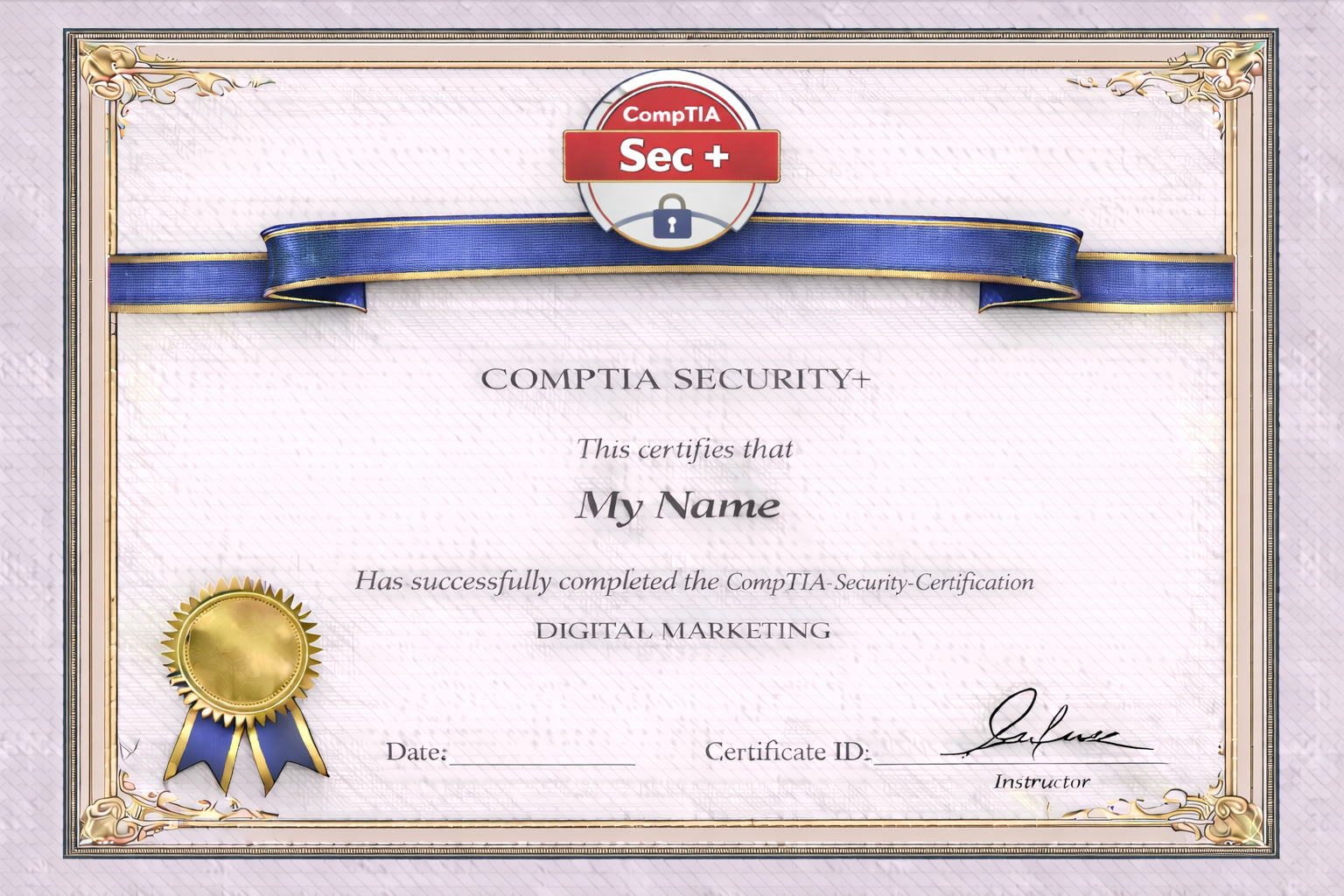CompTIA Security+ Course Overview
The globally recognized CompTIA Security+ certification proves
that candidates have the necessary skills to execute core security functions
and advance their cybersecurity careers. The Security+ certification is an
excellent qualification for people wanting to start or progress in their
cybersecurity career. Security+ certification includes all fundamental security
principles and risk management training, network security identity, access
management, cryptography, and many other topics.
Security+ certification remains prominent in IT because it proves
candidates' capability to resolve contemporary security problems within modern
organizations. The certification exam uses recent security threats alongside
their corresponding protection strategies to deliver candidates' modern network
and system security skills.
Why Pursue CompTIA Security+ Certification?
- Career Advancement: Achieving CompTIA Security+ certification delivers a training foundation to establish network security and system administration roles and risk management careers. The CompTIA Security+ certification has become mandatory or highly desirable for various IT and cybersecurity job positions.
- Industry Demand: Security professionals maintain organizations by protecting their infrastructure because threats to cyber security have escalated along with data breaches during digital transformations. The growing market demands have made organizations actively pursue certified professionals.
- Foundational Security Knowledge: The security principles contained in the certification enable organizations to protect themselves from various cyber-attacks, including both basic malware and Advanced Persistent Threats (APT).
- Recognition by Employers: The Security+ certification has gained worldwide acceptance from businesses, making it a standard requirement for many organizations.
- Up-to-date Skills: Security+ certification provides professionals with the current security technology knowledge base and best practices, including cloud security and risk mitigation strategies and threat management methods
Scope and Job Market
The field of cybersecurity professionals continues to expand because organizations from all sectors encounter rising threats targeting their data and systems. The CompTIA Security+ certification enables entry into security roles requiring basic cybersecurity skills to build essential cybersecurity expertise.
CompTIA Security+ certified workers can work in a variety of professions, such as:
- Security Administrator
- Cybersecurity Analyst
- Systems Administrator
- Network Security Administrator
- Incident Response Analyst
- Security Consultant
- IT Security Engineer
- Penetration Tester
- Risk Management Professional
Many organizations expect a rapid expansion of their cybersecurity job market because they need experts to protect their digital assets. Multiple reports indicate that cybersecurity expert demand will rise significantly during the upcoming decade which establishes this field as an outstanding career choice.
Why should I get CompTIA Security Certification

CompTIA Security+ Certification Training provides comprehensive
knowledge in cybersecurity, covering topics like network security, risk
management, encryption, access control, and threat mitigation. The training
program prepares candidates to take the globally accepted CompTIA Security+
(SY0-601) examination, which serves as a professional credential for
cybersecurity, information security, and network security professionals.
CompTIA Security+ Certification is ideal for IT professionals aiming to specialize in cybersecurity and network security. It is suited for individuals in roles such as security administrators, systems administrators, network administrators, cybersecurity specialists, and IT consultants. This certification is also beneficial for anyone looking to transition into the cybersecurity field from a broader IT background.
The CompTIA Security+ Certification Training covers key
cybersecurity concepts, including:
●
Network Security: Skilled professionals will master an
understanding of firewalls along with VPNs, intrusion detection systems, and
network access control.
●
Threats, Vulnerabilities, and Attacks: The identification of
standard cyber threats includes malware, ransomware, phishing attacks, and
denial-of-service attacks.
●
Cryptography: Protected data stays secure through encryption
techniques, while secure transmission occurs through encryption methods.
●
Identity and Access Management: The system requires user
authentication methods and proper access control management.
●
Risk Management: Organizational assets need risk assessments to
implement protection strategies.
●
Security Architecture and Design: The creation of safe network and
system infrastructure designs.
●
Incident Response and Recovery: Security protocols must be created
to handle security incidents from start to finish.
●
Compliance and Governance: Organizations must understand the
requirements of HIPAA and GDPR, as well as NIST standards.
CompTIA Security+ Certification Training does not require specific prerequisites but candidates benefit most when they have networking knowledge at a basic level and either hold a CompTIA Network+ certification or possess similar practical experience. Students who have fundamental IT knowledge and networking experience will achieve better understanding of the course materials.
The duration of instructor-led training programs for this CompTIA Security+ Certification extends 5 to 7 days based on chosen delivery methods. The training system presents itself through autonomous learning and digital instructor-led discussions, as well as live classroom instruction. The available training delivery methods enable students to choose options that match their lifestyle requirements.
The CompTIA Security+ (SY0-601) certification exam contains 90
questions, which are both multiple-choice and performance-based types. The
certification exam evaluates cybersecurity abilities through assessments of
threat management together with network security and cryptography, identity
management and risk management domains. The examination takes 90 minutes to
complete, and candidates need to obtain at least 750 points from a total of 900
to succeed.
The CompTIA Security+ certification leads to better career prospects for learners because of the growing cybersecurity market. Employers across the globe accept Security+ as their baseline standard for IT security professionals. The certification establishes employment possibilities within Cybersecurity Analysis and Security Administration, Network Security Engineering and Information Security Consultancy and IT Auditing roles—additionally, Security+ acts as a prerequisite for more complex cybersecurity qualifications
The CompTIA Security+ exam registration is possible through the
authorized testing provider Pearson VUE. The exam scheduling instructions with
both Pearson VUE center test options and remote online proctoring options will
be delivered to you following your training completion.
Candidates must reach at least 750 out of 900 possible points to
pass the CompTIA Security+ (SY0-601) examination. The testing area incorporates
numerous cybersecurity subject matters to verify your competence in
safeguarding organizations against security risks.
Yes, after your initial CompTIA Security+ examination failure, you
have the opportunity to retake it because CompTIA allows candidates to retry
within 14 days. CompTIA will enable candidates to retake their exam after
waiting fourteen days. The exam can be taken without any restriction, and
additional fees will be applied for each retake attempt.
Yes, you will obtain the official CompTIA Security+ certification by passing the CompTIA Security+ (SY0-601) examination. The certification boosts your marketable skills for job candidates by proving your technical abilities and verified cybersecurity knowledge.
The CompTIA Security+ certification remains valid for 3 years. The
security + certification requires renewal through CEU acquisition from
supplemental certifications and training or simply retaking the exam. CompTIA
delivers multiple educational pathways that assist candidates in staying
updated regarding the changing cybersecurity landscape.



